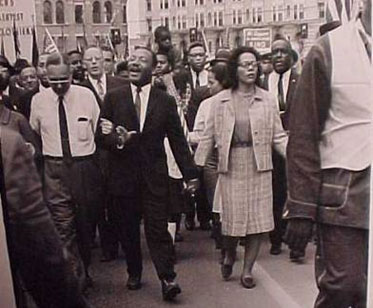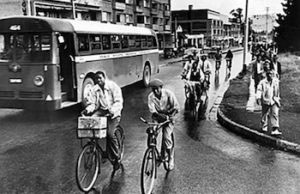Dear Colleagues,
My name is Martha Bouyer, and I am the developer and project director for the NEH Institute for K-12 Educators: “Stony the Road We Trod…”: Exploring Alabama’s Civil Rights Legacy.
“Stony the Road…” offers a unique opportunity for educators to participate in an in-depth, three-week, interactive field study of the modern Civil Rights Movement and the pivotal role that Alabama played in making the promises of the U.S. Constitution a greater reality for more Americans. Teachers will trace the role of protest in American history as a tool used to obtain civil liberties and civil rights by examining events in Alabama that impacted not only our state and nation, but the world. Birmingham will serve as the host city for this Institute, which includes travel to Selma, Montgomery, and Tuskegee — all key “battleground” sites in the struggle for human and civil rights.
“But for Birmingham, we would not be here today.” This statement, made by President John F. Kennedy at a meeting at the White House with Rev. Fred L. Shuttlesworth, the architect of the Birmingham Civil Rights Movement, Dr. Martin Luther King Jr., and other movement leaders emphasizes the significance of Birmingham and its role in the modern Civil Rights Movement.
The struggles for freedom and equality that played out in the streets of Birmingham greeted citizens in the United States and people around the world every day and night by way of television news reports and newspaper headlines. Once children took the lead in the freedom struggle, there was no turning back. With images of schoolchildren facing policemen in riot gear, firemen with high powered fire hoses, the police commissioner in a white tank, and German Shepherd police dogs biting bystanders, the attention of the world was focused on Birmingham in 1963. Linked arm in arm with a resolve that they wouldn’t let anyone turn them around, these young foot soldiers marched into the annals of American history and set free a city once dubbed as the most segregated city in America.
As the nation remembers the events that took place in Alabama during the 1960s, it is most fitting that schoolteachers come here to study the events of that era and examine how events here changed the world. To fully understand the background and accomplishments of the Civil Rights Movement one must examine the economic, social, political, cultural, and judicial institutions that crafted Jim Crow and set the nation on a course with destiny that erupted on a bus in Montgomery, climaxed in the streets of Birmingham, and set a course for the Alabama State Capitol via a bridge in Selma.
Historic Bethel Baptist Church, where Rev. Fred L. Shuttlesworth served as pastor from 1953-1961, will serve as a partner and host site. Visiting Bethel will help educators gain a deeper insight and understanding of how the efforts of movement leaders, working class people, and the courage of children in Birmingham who broke the back of segregation in “America’s Johannesburg.”

Triumphal entry into Montgomery ( Dr. and Mrs. King and Rev. F.D. Reese)
The state of Alabama is synonymous with civil rights. Landmark places like Birmingham, Selma, Montgomery, and Tuskegee have left an indelible mark in the minds of people around the world. Looking back over the last 55-plus years of American history, the United States has made monumental progress as it relates to the cause of civil liberties and civil rights. Separate drinking fountains and restrooms, “colored balconies” in movie theaters, and seats in the back of the bus are memories of the United States that are incomprehensible to students today.
Teachers participating in this Institute will engage in stimulating lectures presented by noted scholars, participate in discussion groups, meet Movement leaders and foot soldiers, examine works of art, literature, and music; and travel to landmark sites dedicated to the preservation of the history and accomplishments of the modern Civil Rights Movement.
The modern Civil Rights Movement forced the nation to re-think, re-examine, and re-structure how it dealt with issues of race, justice, and citizenship. Using a combination of lectures, first-hand accounts from history-makers, travel to the cities mentioned, and primary and secondary source documents, teachers will examine how the political, social, economic, and cultural institutions of the United States of America were changed as a result of the events that took place in Alabama.
Teachers will work in cooperative grade-level groups to develop lesson plans and/or study units based on prior knowledge and knowledge gained as a result of their Institute experiences, interaction with scholars, presenters and peers, “Stony the Road…” staff members, and their travel experiences. All lesson plans and curricular units will be developed based on national standards making it easier for teachers to craft plans that fit their state course of study. We will use the Xcitement Lesson Plan format in anticipation that your work will be published. This year, we will also provide financial support for a few teachers to present their work and Institute experiences at local, regional, and national conferences.
The project director and master teachers will model and present several interactive sessions designed to help participants make curricular connections and explore instructional strategies and formats designed to keep students interested, involved, and motivated.
It is generally hot in Alabama during July. Morning and afternoon showers are common. Be sure to bring an umbrella, comfortable shoes, sunscreen, sunglasses, a hat, a jacket or sweater for when we are inside buildings, a laptop or tablet, and your books for daily reading assignments and if you want them autographed.

Thus far, more than 1,500 teachers from 45 states and five foreign countries have participated in “Stony the Road…”. You are our third cohort as an NEH-sponsored Institute! We decided to try this model because teachers said they wanted and needed more time. We have adjusted the pace and added more scholars, more site visits, more time to collaborate, and more activities that we hope will make your study experiences in “Alabama the Beautiful,” unforgettable. I hope that this letter and the attached information will give you a good sense of the scope of the Institute and answer any the questions that you may have regarding the Institute.
Thank you for your interest in “Stony the Road We Trod…”: Exploring Alabama’s Civil Rights Legacy. Please peruse the attached information regarding the daily agenda, reading assignments, planned activities, and information about this year’s $2,850 stipend. We look forward to working with you as we explore the history of the modern Civil Rights Movement in Alabama and make this era of United States history alive and real for you and your students.
Sincerely,
Martha
Dr. Martha V.J. Bouyer
Project Director
